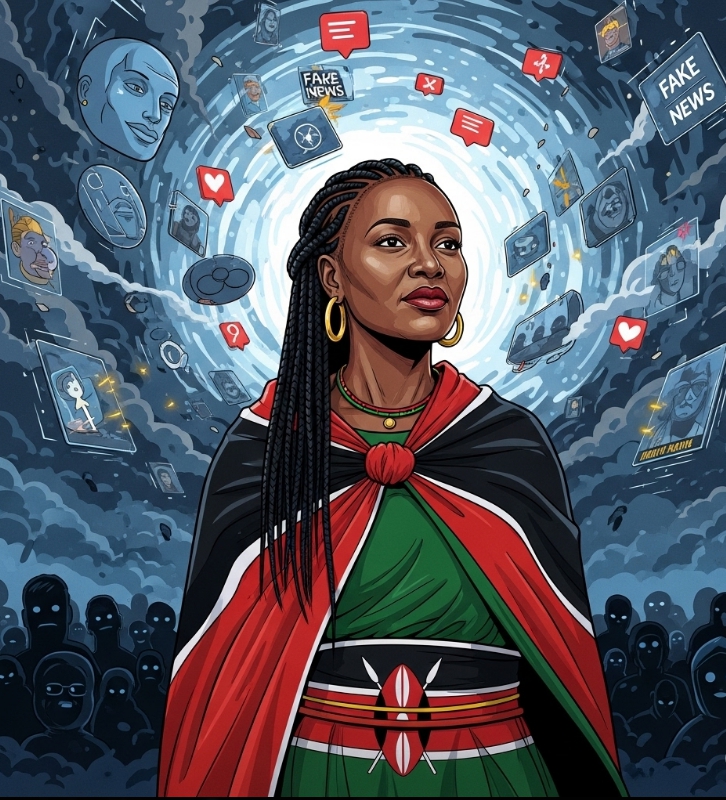As Kenya edges closer to the 2027 general elections, the political temperature is already rising. The bitter lessons from the 2022 polls have set the stage for an even more complex era, where technology amplifies both opportunities and threats. For women who dare to step into the political spotlight, the menace of “fake news” has morphed into something more calculated and deeply personal — a tech-driven weapon aimed squarely at their character, safety, and political future. The propaganda against outspoken women is still as personal and sexualized as ever, but it now travels faster, looks more convincing, and is harder to trace. It chips away at their confidence long before campaigns even start. The unspoken, dirty rules of politics continue to weigh more heavily on women.
2022: From Village Gossip to Viral Attacks
Kenya’s 2022 general election turned out to be a sobering lesson on just how vicious gendered disinformation can get in a hyper-connected, polarized society. Fake newspaper covers claiming that a prominent male politician had fathered a child with a female gubernatorial hopeful, or that a foreign tycoon was having an affair with a politician’s wife, were just scratching the surface. One married journalist, celebrated for her sharp moderation of a gubernatorial debate, found herself smeared online as the “mistress of a foreign president” simply because trolls didn’t like her tough questions.
Veteran journalist and gender columnist Njeri Rugene, who has spent nearly three decades in the industry, noted how things have changed. In the past, such attacks stayed mostly on the ground, spreading through village rumor mills and rarely making it into mainstream news. “Social media changed all that. These attacks now go viral, reach a far bigger audience, and target these women directly,” said Rugene, founder of the Woman’s Newsroom Foundation. The deeper issue, she believes, is entrenched “patriarchy, gender stereotypes, and inequality.”
The personal cost is enormous. Judie Kaberia, Executive Director of the Association of Media Women in Kenya (AMWIK), recalled how a promising woman running for a Member of County Assembly seat in Meru started gaining on her opponent. Soon after, she was hit by a crudely edited audio slideshow sent through WhatsApp, packed with vile lies about her private life. The mental strain was too much. She dropped out.
“They threaten these women. They invent lies. They have no boundaries. And it takes a heavy toll on the mental health and self-esteem of these women. Some just give up.” – Judie Kaberia, AMWIK
It’s telling how gender shapes these attacks. Male politicians are usually grilled over their track records, policies, or corruption. Women, on the other hand, see the conversation pivot to whether they’re married, how their bodies look, or wild tales about their personal lives — repeated until they start to stick.
When the Numbers Back It Up
This isn’t just a handful of horror stories. After the 2022 elections, research group Pollicy tracked over 250 candidates in their study “Byte Bullies”, and the findings were stark:
- Online violence against women in politics was far more common for female candidates than for men.
- On Twitter (now X), 2 out of 5 monitored accounts belonging to women candidates faced sexual harassment.
- These attacks overwhelmingly targeted appearance and private life, not political ideas.
A 2024 report by UNFPA in Kenya revealed that 90% of university students had witnessed technology-facilitated gender-based violence, while 39% had experienced it firsthand. This digital culture normalizes harassing women in public life, making politics an even tougher space for them.
The New Tools: AI, Deepfakes, and Precision Lies
Looking ahead from 2025, the dirty tricks of 2022 are being supercharged by new tech. Experts warn that the next wave of disinformation will be driven by artificial intelligence, making it cheaper to produce and harder to debunk.
- AI-Generated Deepfakes: The ability to create fake but realistic videos or audio of female candidates saying or doing damaging things is a serious concern. These didn’t dominate the 2022 cycle, but with how fast the technology is improving, they’re likely to be a big problem in 2027.
- Automated Troll Farms: Bot armies, powered by AI, can now churn out and spread defamatory content at a pace humans simply can’t match, overwhelming platforms like X, Facebook, and TikTok with coordinated attacks.
- Micro-Targeted Disinformation: Using data analytics, malicious actors can tailor false stories to specific demographics on WhatsApp and Telegram, exploiting local fears with frightening precision.
An Oslo Center report on AI in elections noted that during Kenya’s 2022 polls, women candidates already faced “AI-driven online harassment that damaged their campaigns and widened existing gender gaps.” It’s only expected to get worse.
| Attack Type | Description | Example | Psychological Goal |
|---|---|---|---|
| Personal & Sexualized Smears | Focus on private life, body, or false sexual claims. | Calling a journalist a “mistress,” rumors of affairs, body-shaming memes. | To shame, humiliate, and intimidate, shifting focus away from policy debates. |
| Undermining Competence | Attacks framed through a gender lens to belittle authority. | Viral TikTok mocking Martha Karua’s accent to trivialize her slogans. | To cast women as unqualified or unserious leaders. |
| Low-Tech Fakes | Fake screenshots, chats, or doctored newspaper covers. | A bogus tweet from a foreign president to paint a candidate as desperate for validation. | To build false narratives and force the target to waste time fighting obvious lies. |
| High-Tech AI Disinformation | Deepfakes or AI-run bot campaigns. | A fake audio clip of a candidate making incendiary remarks right before an election. | To provide “proof” for character assassination and sow mass confusion that’s hard to clean up quickly. |
Women Are Fighting Back
Still, Kenya’s women aren’t just sitting around waiting to be victims. They’re crafting a new playbook — blending smarts, solidarity, and sometimes sheer defiance.
1. Knowing When to Laugh It Off
Take Martha Karua in 2022. When a TikTok mocking her accent started circulating, she sought out the creator and laughed with them, robbing the joke of its sting. Meanwhile, digital strategist Pauline Njoroge showed how a sharp, well-aimed comeback can also work wonders. When someone accused her of “spreading rumors like you spread your legs,” her fierce retort shut them down and rallied her base.
2. The “Go Lower” Strategy
Long-time MP Millie Mabona is unapologetic about her approach: “If you drag me into the mud, don’t expect me to play by higher rules. You go low, I’ll go lower.” It’s a bold tactic that refuses to let bullies own the narrative or rely on women staying “polite.”
3. Building a Digital Shield
Fact-checkers like PesaCheck and AFP Factcheck urge women to take proactive steps:
- Professional Social Media Teams: They can filter out and report abuse, taking the worst of it off a candidate’s plate.
- Digital Literacy: Knowing how to use mute, block, and reporting tools is basic self-defense now.
- Strong Personal Branding: A solid, authentic online presence established early can create loyal followers who’ll help push back against lies.
4. Using the Law and Policy
Groups like FIDA-Kenya are also fighting back, challenging stereotypes about gender quotas and spotlighting women’s legislative successes. They’re pushing for better enforcement of laws like Kenya’s Computer Misuse and Cybercrimes Act (2018), though critics say it’s often misused to silence dissent instead of protecting victims. The advocacy for reforms — and for applying the law to actually punish perpetrators of online gender-based violence — is ongoing.
| Strategy | How It Works | When & Why It Helps |
|---|---|---|
| “Love” Approach (Strategic Humor) | Turning ridicule into a joke, engaging lightly with the attacker. | Best for low-level mockery. Shows confidence, defuses tension. |
| Sharp Clapback | Firing back with wit or force to flip the shame onto the troll. | Effective for personal, vile insults. Rallies supporters. |
| “Go Lower” Doctrine | Meeting aggression with aggression, refusing to be cowed. | High-risk but can stop persistent harassment in its tracks. |
| Digital Fortress | Proactively building a strong online presence and defense system. | Essential long-term. Helps blunt all types of attacks. |
| Legal & Institutional Advocacy | Using complaints, lawsuits, and partnerships with NGOs. | Slow but key for accountability and setting precedents. |
Conclusion: Defending Democracy Itself
The battle against gendered disinformation isn’t just about protecting individual women. It’s about safeguarding Kenya’s democracy. When half the population is systematically bullied, lied about, and scared out of public life, democracy shrinks. As the 2027 election draws closer, disinformation tactics will almost certainly get smarter. That makes the resilience, clever counter-strategies, and solidarity of Kenya’s women leaders — alongside stronger laws and a more informed public — absolutely critical to ensuring the political stage remains a place for ideas, not a cesspool of gendered hate.


